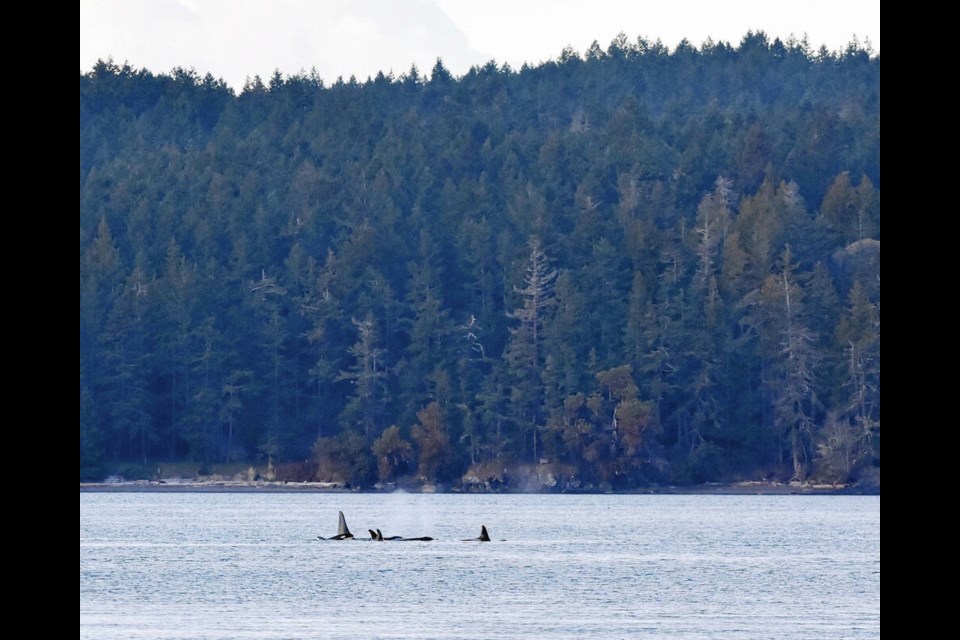The Canadian Armed Forces will resume surface gunfire training in the Strait of Juan de Fuca as early as this month after a three-year hiatus while a whale study was underway.
The firing range known as Whiskey Hotel is a 30-kilometre-long and 11-kilometre-wide swath of water between Sooke and Port Renfrew, about a kilometre off land, where the Canadian and U.S. navies and coast guards practise using sea surface and aerial machine guns and other small weaponry.
The Department of National Defence said gunnery training was temporarily paused in 2019 “out of an abundance of caution” while a study on the impacts to marine mammals, including the critically endangered southern resident killer whales, was underway.
The study by Golder Associates on behalf of the Canadian Armed Forces concluded that with existing mitigation procedures — including real-time reports from the Canadian Coast Guard’s Marine Mammal Desk on where marine mammals are located — the effects of gunfire on marine mammals are expected to be “negligible.”
Golder said its evaluation focused solely on the acoustic effects on marine mammals and it did not evaluate the potential for gunfire strikes, noise effects on other marine wildlife such as birds or fish, effects on homes or tourism businesses in the area, or contamination of the water from debris.
Golder said further studies would be required to evaluate those effects.
The report says, however, that the Royal Canadian Navy and U.S. Coast Guard follow firing orders that ensure weapons aren’t fired towards land, vessels, aircraft and marine mammals. “These areas are specific to each weapon and are based on weapon hazard patterns that were developed from a worst-case scenario that includes deflection error, environmental factors, ricochets and round fragmentation.”
The Whiskey Hotel range overlaps with critical habitat of the southern resident killer whales and the grey whale, and the operating area is located offshore of known seal haul-outs.
At least 19 species of marine mammals have the potential to be in the area at different times of the year, including six species of toothed whales, seven species of baleen whales, five species of pinniped and sea otters.
The southern resident killer whale population, down to 73 animals in three pods, gets special mention in the Golder report. “As the area is located within SRKW critical habitat and within key foraging areas used by this population during the summer months, potential effects to the population are of particular importance,” said the report. “Modelling results for all scenarios indicate that small arms noise will not exceed the underwater disturbance threshold for any marine mammal species.”
In a statement about the southern resident killer whales, DND said “neither injury nor disturbance is considered likely to occur.”
“All vessels and aircraft, including those of allied nations, conducting gunnery within the operating area are required to comply with stringent mitigation procedures, which includes information sharing from the Canadian Coast Guard Marine Mammal Desk. [Those] notifications provide information on recent and real-time marine mammal activity directly to the range user so that critical decisions can be made to stop activities.”
The Whiskey Hotel training area is used by several units on both sides of the international boundary, including the Royal Canadian Air Force. Military training exercises can occur any time of year, but most often in the summer months, which provide calmer seas and a more stable platform for firing. Training sessions can occur from vessels such as frigates or from helicopters.
The U.S. Coast Guard uses the gunnery range the most, about 30 times a year, according to the report. It uses three automatic weapons — the MK38, .50 caliber and M240 — and each training run is allotted 200 rounds lasting for 10 to 15 minutes. The total number of rounds expended per day depends on the number of crews being trained.
The Pacific Whale Watch Association, which has 14 member companies in Canada and 16 in the U.S., said it supports the study and the decision by DND to resume activity on the range.
Executive director Erin Gless said whale-watchers report to the Marine Mammal Report Desk about whale movements on a regular basis, which will help the Armed Forces mitigate contact with whales.
“It’s more effective that we work together and provide this real-time information,” said Gless. “Because if there’s a whale coming into the area, they will immediately stop.”



